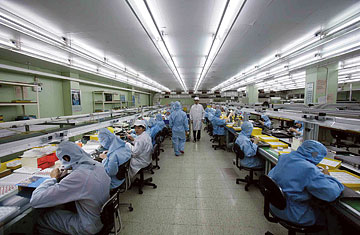
The Dailywin Watch factory, above, moved into higher-technology products and production methods to maintain profits
(3 of 3)
In theory, the result of this painful winnowing process will be a more efficient and competitive manufacturing sector. China is "maintaining the strong and eliminating the weak," says Paul Yin, president of the Chinese Manufacturers' Association of Hong Kong. "The stronger, bigger manufacturers will survive and probably be better." While this transformation is taking place, however, the impact on the Chinese economy might be severe. Factory closures will reduce the number of available jobs for China's 1.3 billion people, which could foment social unrest. Guangdong could even fall into recession over the next two to three years, says Dong Tao, an economist at Credit Suisse in Hong Kong. The danger, he says, is that factories are vacating the region too quickly for new production to take its place. "It is easy to push people out, but harder to create new industries," says Tao. "The pressure is on."
The effects of China's industrial reformation will be felt well beyond the nation's borders. A higher-cost export sector in China will likely mean higher prices for many essential products worldwide. An April survey of Chinese consumer-goods suppliers by Global Sources, a Hong Kong – based sourcing information provider, found that 90% planned to raise prices this year, adding to worldwide inflationary pressures. "We took it for granted that Chinese products would be cheap forever," says Tao. But "the beginning of the end of this period may have already arrived. 'Made in China' won't be sold as cheap as before."
This could cause pain in the Wal-Mart aisles, but it's a boon for countries such as India and Bangladesh, where average wages are low. Economists anticipate that companies making labor-intensive products like clothing will increasingly look beyond China to set up new factories. Credit Suisse's Tao predicts that a third of the factories closing in Guangdong might pop up in other countries. Vietnam, where wages are about 40% lower than in China, has already been a beneficiary. Over the past several years, manufacturers looking to diversify their production bases have been investing heavily in Vietnamese factories. ThreeSixty Sourcing, a Hong Kong – based buying agent for multinational brands, is in the process of opening its first office in Ho Chi Minh City to seek out new suppliers for its customers, away from China's rising costs. "We've historically been very China-focused," says Chris Laurence, ThreeSixty's CEO. But "for the first time there are challenges [in China]. When things are good people don't look elsewhere, but when things aren't good people start looking."
China, though, still retains some major competitive advantages. Businessmen say that clusters of factories in similar industries that have formed along the mainland's coast create a ready supply chain for important raw materials and components, while China's superior infrastructure makes shipping products overseas extremely efficient. These factors have convinced many industrialists to stay put. "I've asked myself: Can I move my operations out of China?" says Clarence Cheung, director of You Eal, a manufacturer of keypads for mobile phones and remote controls. "The answer: It's impossible." Other factory owners have chosen to open plants deeper in China's interior, where they can find lower wages and a larger pool of job seekers, rather than move to other countries. Willy Lin, managing director of Hong Kong sweatermaker Milo's Knitwear, opened a factory earlier this year in Jiangxi province, some 400 miles (650 km) from Hong Kong, where his costs of operation are about 20% lower than in Dongguan. "We all have to deal with the new China," Lin says.
These advantages, however, won't last forever. As Beijing attempts to reform China's manufacturing sector, competitors are striving to catch up. India is rushing to improve its feeble infrastructure; Indonesia is changing its investment and tax laws to make itself more attractive to foreign firms. If these countries can add their lower labor costs to a friendlier business climate, they could begin to give China a run for the world's money. At TAL, managing director Harry Lee is still committed to China — he plans to double the size of his Dongguan factory by next year — but he adds that the changing commercial landscape has made it harder to decide where to build a factory in the future. "Five years ago, my first choice would have been China; my second, China; and my third, China," he says. "Now my first three choices are: I don't know, I don't know and I don't know." For several years, China has been leading the global manufacturing race. The country will have to keep on its toes to stay out in front.
with reporting by Ling Woo Liu / Dongguan and Martha Ann Overland / Hanoi